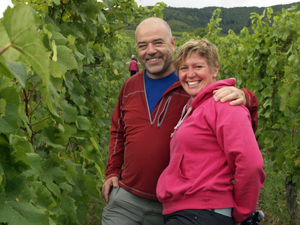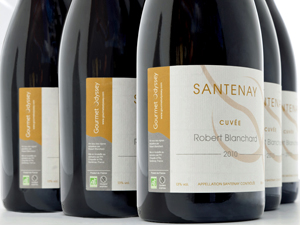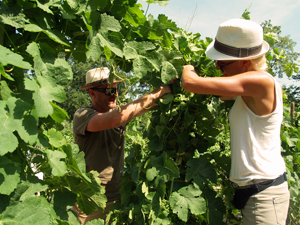The increasing role of robots in organic vineyards
- Categories :
- Wine
- Wine News
- Gourmet Odyssey
- Château Coutet
The first robots appeared around 10 years ago, with notably the Vitirover, a grass cutting robot that was tested for the first time at our partner winery, Château Coutet in Saint-Emilion. We’ll be asking a few questions to Adrien and Matthieu David-Beaulieu, the son and nephew of the inventor of the robot, and winemakers at Château Coutet at the end of this article.
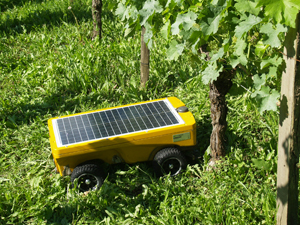
The main aim of robots is to reduce the workload of the winemakers. Finding the people to work in the vineyards is becoming more and more difficult, particularly in finding qualified tractor drivers. And the tractors aren’t always very suited to working in the vineyard as they can easily uproot the vines. The second factor that helped robots find their place was the questioning of the use of herbicides and other chemical products as opposed to more environmentally friendly alternatives.
The benefit of using robots that is most sought after by the winemakers is to increase their productivity. A winemaker’s year is very cyclical and is sometimes a real race against time. Of course, the robots have not yet reached a stage when they can replace the winemakers and thankfully so! They can be a welcome help in long and repetitive tasks like weeding, spraying, or working the soil. This new way of farming also helps attract a new type of worker, one that is younger and more interested in technology.
Even though the revolution is underway, there is still resistance from some winemakers. The main reason remains the social impact. Working with new technological tools calls for a change in working habits and lots of time before integrating them into the workflow. You also need to think of training, as using robots isn’t always innate and requires time spent learning how to use them. The effort needed to integrate the robot should not be overlooked because even if it is there to help lessen the workload, humans still remain central, and the robots can present some added risks, whether they be physical by cuts or flying debris, or mental by adding stress to the users. You need to learn to trust the machine which is not always an easy thing to do.
The second constraint is of course the cost of these robots, as you need to pay between 80 000 and 200 000 € to buy one. You then need to add annual maintenance costs as well as adding all the GPS coordinates for each vineyard plot, which can quickly add up.
It is important to note that the robots have certain limitations. They are only allowed to circulate on private property, and so can’t use the road or public paths between vineyard plots, creating an additional task of towing the robots from one plot to another. You also need to have a trained operator close by in case of emergency.
The robots are also reliant on the topography and weather. For example, robots such as the Vitirover, can’t be used on slopes greater than 15% or on ground that is too slippy.
A closer look at Vitirover
Xavier David-Beaulieu, grew up at Château Coutet in the family winery that has always been cultivated organically. He couldn’t understand why there were no solutions to reduce the use of glyphosates in the vineyards elsewhere. It is estimated that 8000 tonnes of glyphosate are used each year by professionals in France. It is both dangerous for the health because it is cancerogenic, and also for the environment because it destroys the biodiversity.
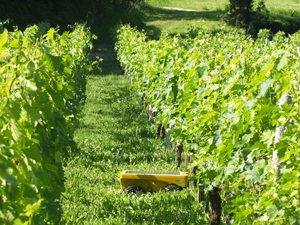
Xavier David-Beaulieu partnered with Arnaud de la Fouchardière to create Vitirover, the first grass cutting robot. It was designed to reply to the need of returning to farming techniques that were kinder on the environment by using new technologies.
The Vitorover is a small robot, 30 cm wide, weighing 20kg, and that is 100% autonomous thanks to its solar panels. It moves at 500 m / hour and can cut a hectare in 15 days. They are not designed to work alone, but in a flock with a shepherd that controls them remotely with a smartphone, and who can intervene if necessary.
The Vitirovers aren’t available for sale, the company instead offering a service contract to maintain the vineyards, so that the clients don’t need to upkeep the machines over the long term. Today Vitirover doesn’t just interest winemakers, but other sectors too. SNCF use them to maintain their railway lines, and EDF to maintain the grass around their electricity pylons.
We asked a few questions to Adrien and Matthieu David-Beaulieu, Xavier’s son and nephew, who are now the winemakers at Château Coutet, and use the Vitirover daily.
• Overall, how do the clients perceive the use of robots in the vineyard?
“That depends. Those that think that their use replaces humans haven’t generally had to personally battle against grass and weeds in an organic way in a vineyard. Whilst others appreciate this new technology that can replace tasks which are often hard and tiring, as much for the environment as for those that do the job. Some people are also admiring of the service provided by the new solar technology which uses very little energy” recounts Adrien, “but usually the feedback from the public is positive.” “We’re often told that it adds a touch of modernity to our traditional philosophy” adds Matthieu.
• Does the use of the Vitirover impact the quality of the grapes?
Adrien is convinced, “by not compacting the soil for example, the roots can dig deeper and therefore better resist climatic challenges such as droughts, allowing the grapes to reach a better maturity when faced with a heat wave.”
“I’d add that it’s not the robot directly, but more the presence of grass throughout the vineyard. During a very dry year, the grass will compete with the vines, that will produce smaller but more concentrated grapes. During a rainy year, the grass will limit the amount of soil erosion, and help the water penetrate the soil thanks to the root structure” Matthieu explains.
• How do you reinvest the time saved by using the robots?
“The robots enable us to save time spent cutting the grass. This extra time can be used to concentrate on the more skilled jobs tending to the vines, treating them, or repairing the trellis system. In a vineyard, you can never have too much time on your hands.”
• Is the Vitirover sufficient to maintain the vineyards, or do you need to use other tools too?
We choose to let the grass grow fairly high during spring so that a large proportion of the plant extracts can reach maturity or heading, and so can reseed naturally. We then use a small light tractor mower for the first cut between the rows. The robots are then used to continue the work between and around the vine stocks. Once the vineyard has been prepared and levelled after winter, the robots are autonomous to take care of the grass. The shepherd monitors the progress of the robots and checks that all is in order” adds Adrien.
Learn more about working organically in the vineyard and to get involved in some of the tasks alongside the winemakers at Château Coutet or one of our other partner wineries during a Gourmet Odyssey Wine Experience Day.



